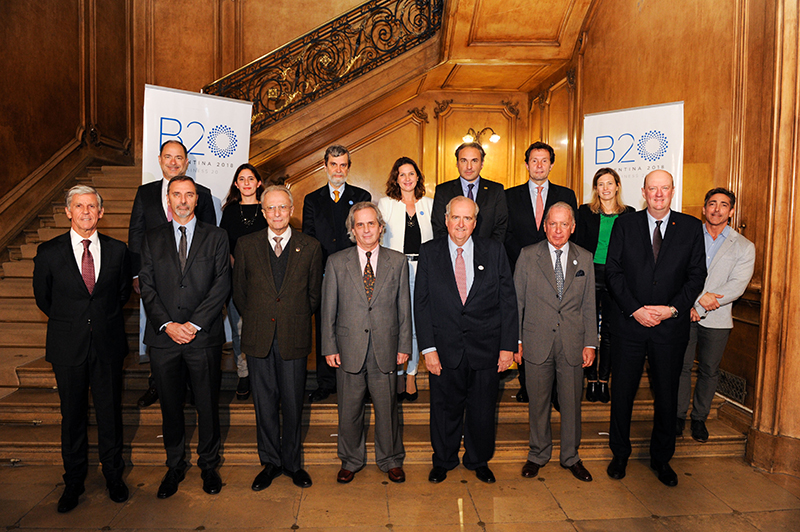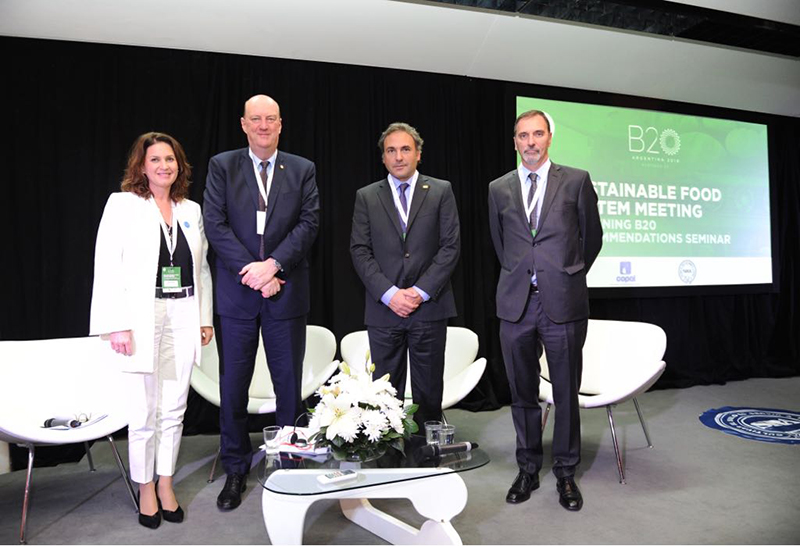Arcor in the B20 and the recommendations for the future of food
On Thursday, July 26, in the afternoon, the B20 Sustainable Food System Task Force led by Luis Pagani, presented the main contents of the document prepared with the set of Public Policy Recommendations for the G20 member states.

In his opening words of the event, Luis A. Pagani stressed that "The global development of a sustainable agro-food system is a key challenge for the preservation of human life and the planet, given the existing pressures to feed the growing population in a context of scarce resources, this development is also a necessary condition and a core pillar in order to achieve the Sustainable Development goals of the 2030 agenda".
Likewise, the first panel was moderated by Cecilia Rena, Deputy Chair of the Task Force and counted with the participation of Phil O'Reilly, General Director of the OECD's Business and Industrial Advisory Committee (BIAC); Miguel Kozuszok, President of Unilever Latin America; and Francisco Lugano, President of CREA (Argentine Association of Regional Consortiums of Agricultural Experimentation).
During the closure, Cecilia Rena highlighted: "Today we present 15 recommendations of the relevant topics of a Sustainable Food System, accompanied by their action plans, the KPIs to measure their progress, the contribution to the 2030 agenda and the commitments assumed by the private sector. We hope that our contribution will materialize in public policies and concrete actions, that improve the quality of life of the people, preserve the resources of our planet, and contribute with sustainable development. We have a great opportunity ahead and also a huge responsibility with future generations".
Finally, Luis Pagani summoned the participants to share the Task Force's work, reflected in the Policy Paper, in all the relevant institutional, international, national and local spheres, in order to achieve concrete and significant progress in improving the levels and living conditions of the people, in the elimination of hunger and poverty, and in the achievement of the goals of the 2030 sustainable development.
Likewise, last Saturday, July 28, Luis A. Pagani - as Chair of the Task Force on Sustainable Food System - shared with the Ministers of Agriculture of the member states of the B20 the main messages and recommendations of public policies for the development of a sustainable food system.

The G20, a Group of 20
The G20 is the main international forum for economic, financial and political cooperation: it addresses the major global challenges and seeks to generate public policies that resolve them. Together, the G20 members represent 85% of the global gross product, two thirds of the world population and 75% of international trade. The G20 debates are also enriched by the participation of international partner organizations, invited countries and affinity groups, representing different sectors of civil society.
What if the B20?
Business 20 is an annual exchange process that brings together the business community of the G20 countries and invited nations, in order to provide recommendations for specific public policies for an inclusive and sustainable development. It is one of the seven affinity groups of the G20 and brings together the main actors of the national and international business sector.
How was the work process of the Sustainable Food System’s Task Force of the B20?
With more than 90 companies from different countries from the G20, the Task Force on Sustainable Food System was formed under the leadership of Chair Luis Pagani. The process of developing the document with public policies recommendations (Policy Paper) began with an in-depth analysis of the most important challenges facing the global food system. After considering a long list of possible topics to be addressed, the task force agreed on a set of recommendations on five topics:
1. To eradicate malnutrition, undernourishment and obesity.
2. To ensure the conservation of the environment, the mitigation and adaptation to climate change.
3. To promote the development and adoption of technologies.
4. To remove barriers to global food trade.
5. To minimize food losses and food waste. Get to know more about the B20






